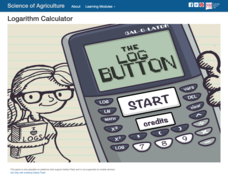Curated OER
Sexual Health and Hygiene
By examining harmful health and hygiene practices, teens will be able to determine what is best for their body. Advertisers for health/hygiene products will also be evaluated for "best interest" criteria. The class will begin by...
Curated OER
Reproduction, Day 2: Pregnancy
Nearly all students have seen pregnant women and may have questions about human development. Intended for secondary students with mild to moderate mental disabilities, this lesson defines the process of pregnancy in a developmentally...
Curated OER
Lesson 23: Reproduction - Day 5: Birth Control
Students with mild to moderate disabilities discuss human reproduction and the importance of preventing pregnancy. They review reproductive anatomy, sexual decision making, and what birth control is. The lesson concludes with a...
Curated OER
HIV/AIDS & Other STDs, Day 1: Germs & Risk
Assist your secondary special education class for understanding risky behavior, hygiene, and STDs. The class discusses how germs spread, how people get sick, and what needs to be done to prevent the spread of communicable diseases. They...
Curated OER
Reproduction, Day 1: Reproductive System
Engage Secondary Special Education students in a developmentally appropriate lesson on human reproduction. They review genital anatomy and 5 key components that comprise the reproductive cycle. Perfect for a mild to moderately disabled...
Curated OER
Puberty: Day 2
Learners investigate human health by researching sexual health facts. In this puberty lesson, students identify the changes that will occur in a teenage body over the next several years and what the eventual outcome will be. Learners...
Curated OER
Pregnancy: Day 2
Students discover life science by identifying the reproductive process. In this pregnancy lesson, students read text which discusses the responsibility required to create a child as well as the economical and social means to raise one....
Purdue University
What a Waste of Food!
Follow the life of an apple from harvest to the consumer. A three-part lesson describes the different steps to get an apple from the farmer to your kitchen and the approximate waste that happens at each step. They discuss the process and...
Learning Games Lab
Bacteria Sampling
Scholars explore the procedure for bacteria sampling in a virtual lab by first walking through a detailed step-by-step procedure of preparing the samples of raw milk and pasteurized milk, growing the bacteria, and comparing results....
Learning Games Lab
Gram Staining
Scholars use a lab simulation to test contaminated yogurt for bacteria by gram staining. They learn proper lab procedures for handling bacteria and for sterilizing equipment, and then walk through the process on their own to try gram...
Learning Games Lab
Controlling Water Activity in Food
Food storage matters! Scholars learn how the amount of water in corn can affect its rate of spoilage. They create a control group, then test three corn samples stored in three different locations for water activity. As a result of the...
Learning Games Lab
How to Use Oil Immersion Microscope
Teach the class how to use a microscope to identify bacteria in food. Scholars explore the different parts of the microscope and learn how to determine total magnification. They walk step-by-step through the procedure of preparing slides...
Learning Games Lab
The pH Scale and Meter Calibration
What are the different ways to test for pH? First, scholars explore the pH scale and a common way to test for acidity and alkalinity. Then, they learn about the importance of pH in food safety and why variance in pH could potentially...
Learning Games Lab
Testing and Adjusting pH
Pupils learn how to control food spoilage by adjusting the food's pH. They see that one of the most dangerous bacteria can grow in food if people don't handle and store food properly. Using knowledge of the bacteria's preferred pH,...
Learning Games Lab
Nitrogen in Fertilizer
Nitrogen is an essential element for productive farming. An interactive lesson explores the chemical makeup of different fertilizers and their corresponding nitrogen content. The interactive challenges individuals to complete molecular...
Learning Games Lab
Nitrogen in Pollutants
Responsible farming is important for maintaining natural resources. Eager scientists complete a WebQuest to explore what happens to nitrogen when it enters the soil. They learn about the chemical makeup of nitrogen-based molecules and...
Learning Games Lab
Scientific Graph Reading
Interpreting graphs is an essential skill for young scientists. An interactive online lesson gives individuals an opportunity to review the components of a graph and learn to read and interpret the shape of a graph. The lesson includes...
Learning Games Lab
The Magic of Reading Graphs
Making conclusions from graphs doesn't need to seem like magic. Learners explore an interactive lesson on reading graphs to strengthen their skills. The content discusses how to read the axes of a graph and draw conclusions based on the...
Learning Games Lab
Logarithm Calculator
Support your young scientists' knowledge of logarithms with a quick video lesson. The instruction first presents the relationship between a base-10 logarithm and an exponential equation. It then demonstrates how to use a calculator to...
Curated OER
Where Should It Go? Recycle? Compost? Incinerate? Landfill?
Students discuss what happens to trash after it is collected. They sort "clean" trash into groups depending on whether it should be recycled, incinerated, placed in a landfill, composted or if it is something we could avoid using.
Curated OER
My Feet
Students examine the various parts of the feet. They listen to the book, My Feet, by Aliki, discuss the different parts and purposes of the foot, trace one of their feet on paper, and compare the foot tracing to another tracing several...
Curated OER
Let's Roam Together
Pupils collect information about buffalo and transform their classroom into a wildlife park. For this conservation lesson, students work in groups to research a question pertaining to buffalo populations and habitat requirements. They...























